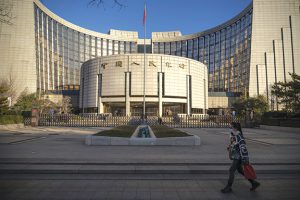Bloomberg
China’s central bank repeated a pledge to proactively address mounting economic pressure and also highlighted a drop in deposit rates, a decline that could spur banks to lower the cost of borrowing for the first time in months.
The People’s Bank of China (PBOC) reaffirmed it will focus on supporting small businesses, sectors and groups hit by Covid-19 outbreaks, and vowed to use various monetary policy tools to keep overall liquidity ample, according to its first-quarter monetary policy report.
The mention of the recent drop in deposit rates could be an indication that lenders will soon lower their loan prime rate, the de facto benchmark lending rate, Citic Securities analysts led by Cheng Qiang wrote in a report. Banks last reduced the rate in January after the central bank cut the rate on its one-year policy loans, and the announcement for May is due at the end of next week.
The weighted average deposit rates declined by 10 basis points to 2.37% in the last week of April, the PBOC report said. Bloomberg reported in mid-April that the PBOC had urged banks to cut the rates. A lower rate helps reduce banks’ funding costs and allows them to cut lending rates without squeezing profit margins.
However, the central bank is unlikely to touch policy interest rates, the Citic Securities analysts said. Since January the PBOC has refrained from adjusting those rates and only provided a modest cash boost to banks in April, disappointing investors.
Despite repeated pledges to support economy and stabilise markets, PBOC has been reluctant to adopt aggressive easing measures and has instead relied on new structural tools such as relending to provide financing help to targeted sectors.
That trend is likely to continue, according to Goldman Sachs Group Inc. economists led by Maggie Wei. They wrote in a note late Monday that they expect policy interest rates and the overall reserve requirement ratio, or the amount of cash banks must hold in reserve, to remain unchanged, adding that they foresee “more usage of targeted tools such as relending to support the overall economy.†The economists added that infrastructure
investment will be the main
policy lever in coming months.
The PBOC report also indicated that the central bank welcomed a relaxation of cities’ property controls, saying it supports authorities setting policy based on local conditions to meet demand from first- and second-time homebuyers.
The central bank reiterated it will keep a close watch on inflation and support the supply of grain and energy in order to keep prices stable overall. It will also monitor the changes in advanced economies’ monetary policy, with the aim of achieving internal and external balance while setting its own agenda.
Recent Covid-19 outbreaks “have caused a greater impact on the economy,†the PBOC said in the report, noting that the consumption sector has weakened, companies’ output was lower and supply chain disruptions have increased. “We need to strengthen our confidence, take decisive actions and
actively overcome the
challenges,†it said.
The government is also increasing its promises to help the economy recover from the latest Covid outbreaks. Vice Premier Hu Chunhua on Monday called for efforts to ensure the stability of production for companies in foreign trade and foreign enterprises, the official Xinhua News Agency reported.
Meanwhile, the State Council — China’s cabinet — called on local authorities to provide small businesses subsidies on rent, utilities and costs related to Covid controls in a set of new guidelines. Major state-owned banks will strive to increase loans for small firms by 1.6 trillion yuan this year,
according to the guidelines.
And Liang Tao, vice chairman of the banking and insurance regulator, urged lenders to provide financing support to Covid-stricken industries in an interview with Xinhua.
 The Gulf Time Newspaper One of the finest business newspapers in the UAE brought to you by our professional writers and editors.
The Gulf Time Newspaper One of the finest business newspapers in the UAE brought to you by our professional writers and editors.
